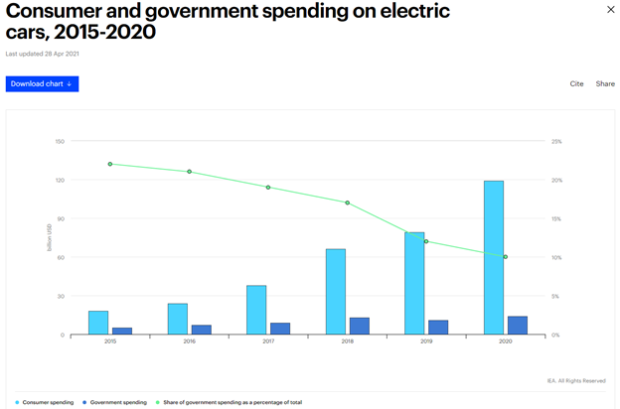Despite fears over the pandemic, it’s been an exciting 12 months for renewables. With many nations ramping up their intentions for electric vehicles, could we see EV stocks becoming the best appreciating asset on Wall Street?
Before we look to solve this question, let’s explore why we may be at the beginning of a boom period for stocks related to electric vehicles.
Firstly, the arrival of the Biden administration in the US has led to the proposal for $174 billion funding for electric vehicles and a $2.5 trillion green infrastructure plan that looks set to create new employment opportunities and grow the renewables industry significantly over the coming years.
This optimism has already led to many EV companies posting favourable Q1 reports across the industry, and with an anticipated 10-year tax credit extension for renewables just around the corner, it seems that the fundamentals of many public EV companies will continue to receive boosts into the future. Tesla, one of the market leaders in the EV industry, delivered impressive Q1 results in 2021 which underlines the volume of demand emerging for electric vehicles.

The chart above shows that despite the arrival of the Covid-19 pandemic, government and consumer spending on electric vehicles alike reached new highs in 2020.
The United States isn’t the only nation to ramp up its accommodation of EVs in the near future. The United Kingdom recently brought forward the date in which it plans to outlaw the sale of new petrol cars to 2030 from its original date of 2040. France, Spain, Denmark, India, Ireland, the Netherlands and Sweden all also have similar measures in place that aim to push forward EV adoption by 2030 or 2040.
Are Electric Vehicle Stocks a Buy?
Although the future is undoubtedly bright for electric vehicles, buying stocks that are certain to grow alongside the industry is still difficult.
Companies with strong track records of earnings growth and market outperformance that are forming bullish chart patterns must be regarded as the highest potential stocks to buy and watch in a given industry, but there aren’t many EV stocks that possess such appetizing fundamentals at this stage. Notable EV stocks like Fisker (FSR), Canoo (GOEV) and Lordstown (RIDE) don’t currently offer the bullish chart patterns that can indicate buy signals, while other players like Rivian are yet to go public. Elsewhere, companies like Lucid, Faraday Future and Xos Trucks are debuting off the back of a blank-check deal.

Chinese EV stocks like Nio (NIO), Xpeng (XPEV) and Li Auto (LI) all have functioning production lines that are selling tens of thousands of EVs but still remain unprofitable at present. There’s also the threat of current traditional motoring leaders like Ford (F) and General Motors (GM) that are set to make further inroads into the industry – fending off current competitors.
Given that they’re immersed in an emerging industry, it’s unsurprising that EV stocks appear to be more fragile at this stage in their company’s development. This makes it more difficult for investors to identify the highest potential stocks. For instance, we can look to EVgo, which has installed over 800 charging points around the US, while ChargePoint Holdings boasts 112,000 discrete locations for charging opportunities around the world. This means that two innovative stocks are likely to be vying for the same growth over the next decade. While the eventual most dominant company will likely represent a great buy for investors, the loser is likely to struggle to deliver on its growth potential.
This means that if you’re looking to add EV stocks to your portfolio, it’s imperative that you keep alert to industry trends and developments that may impact your holdings. “Own research is always a top priority,” says Maxim Manturov, head of investment research at Freedom Finance Europe, a Nasdaq-listed online brokerage. “You should know as much as you can about the company in question, because it will both provide you with confidence and an opportunity to take urgent measures in case anything goes wrong; in other words, this is about risk planning and management.”
Be Aware of Policy Changes
Government policies can both help and hinder the EV market, so they’re likely to play a major role in the long-term appreciation of electric vehicles. While the Biden administration appears to be very supportive of zero-emission vehicles and is currently making moves to replace the government’s fleet of 650,000 cars, vans and trucks with EVs, it doesn’t necessarily guarantee that consumers will follow suit – meaning that some policy changes are more valuable than others to the industry.
Notably, the chinese slashed subsidies for solar energy in 2018 in a move that heavily impacted the industry. Despite solar energy and electric vehicles being different industries, both can rely on subsidies in order to push forward adoption.
Although the current signs are strong that electric vehicles will play a significant role in the future of transportation, significant regime changes in nations that are pivotal to the industry like in the US or East Asia could set back the growth of EV stocks significantly.
For this reason, it’s clear that there is a lot of potential for EV stocks to become major leaders for growth, but the industry is especially fragile – meaning that no investments should be made without a comprehensive level of research prior. In an ecosystem that’s heavily dependent on government policy, it certainly pays to keep your ear to the ground.


The most comprehensive and detailed article ever came on EV possibilities. Great article!